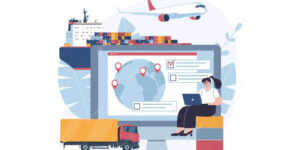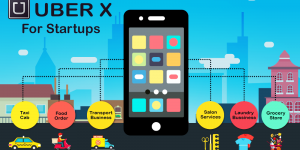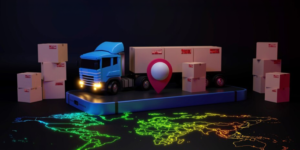
Mobile apps are changing the transportation and logistics sector like never before. Real-time tracking to automated delivery control, they have been the engine of efficiency, visibility and customer satisfaction. This blog explains how mobile technology is transforming the entire logistics ecosystem and driving the future of smarter, faster movements.
Transportation of goods and people is so different today compared to how it used to be ten years ago. Technology now runs every delivery, every trip, every mile. Reason behind this change? Mobile apps.
They have now become the brain of transportation and logistics of modern times. Be it tracking of a shipment, route planning, or fleet management, mobile apps are now at the centre of global movement. Hours of coordination are reduced to seconds using a smartphone.
Logistics was once erratic, with deliveries lost and trucks stuck in traffic. Mobile technology has changed that narrative. Live updates, real-time communication and intelligent data analytics have transformed chaos into clarity.
So, let’s understand how mobile applications are transforming transportation and logistics to enhance efficiency, reduce expenses and reshape customer demands. With the rise of Mobile App Development, today’s systems operate smarter and faster than ever before.
1. Real-Time Tracking and Visibility: The Heart of Modern Logistics
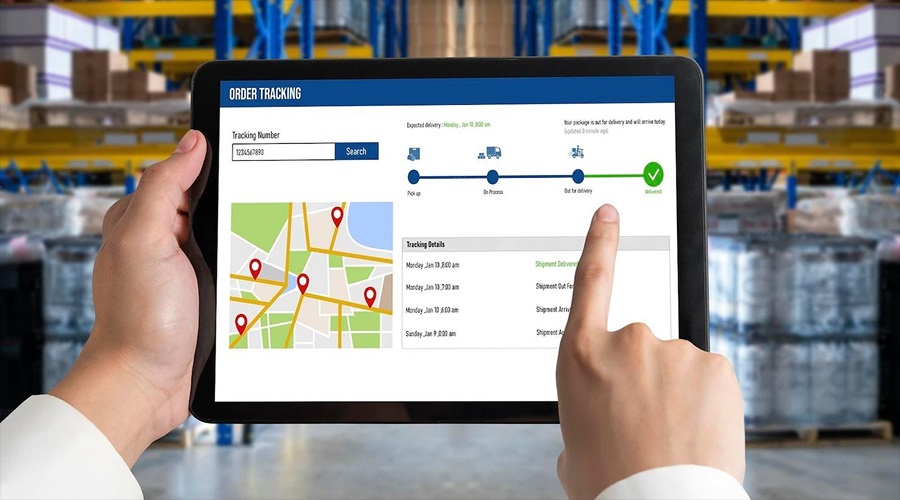
Tracking was once used to call drivers or read records. Today, mobile applications provide full transparency. Customers and businesses are able to know the movement of their goods in real-time. The use of GPS guarantees immediate visibility of all routes, stops and delays. This openness generates trust.
Customers are aware of the position of their orders, and the businesses can make plans and react to changes in real time. Real-time visibility also minimises loss and theft, which aids in companies saving time and money. Data is power in logistics, and mobile apps provide that power in the palm of your hand.
2. Route Optimisation: Smarter Paths, Faster Deliveries
Gone are the days of guessing the most appropriate path. The mobile applications have become intelligent with the use of traffic data, weather information and smart algorithms to determine the most fuel-efficient and quickest routes to drivers.
For transport firms, this contributes to lower fuel costs, lower wear and tear of the vehicles, and happy drivers. To customers, this means faster deliveries and accurate ETAs. Specialised logistics software, applications like Google Maps, Waze, and others have turned the process of route optimisation into a science, which makes all deliveries smarter and easier to predict.
3. Fleet Management: Keeping Operations Under Control
The fleet management process was based on phone updates and manual logs. Nowadays, mobile applications are doing it all, from tracking motor health to driver analytics. Managers are able to monitor every vehicle, allocate tasks or get real-time notifications on a breakdown or delay.
Even fuel consumption, engine temperature, and service plans can be tracked with IoT (Internet of Things) integration. This proactive knowledge prevents downtime and increases the life of the vehicles. Mobile fleet management transforms data into decisions, fast, intelligent and economical.
4. Enhanced Communication: Connecting Drivers, Managers, and Customers
The issue of miscommunication was once among the biggest challenges in logistics. One missed call has the potential to halt a chain of delivery. Mobile applications have solved that issue.
There is now real-time communication between drivers, dispatchers, and customers. All people are kept updated by using notifications, chat options, as well as automatic updates. For logistics companies, this seamless communication enhances coordination and minimises human error. To customers, it generates trust and openness. Timing is everything in a fast-paced world, and mobile apps are a perfect way to communicate it.
5. Inventory and Warehouse Management: Smarter Storage, Faster Fulfilment
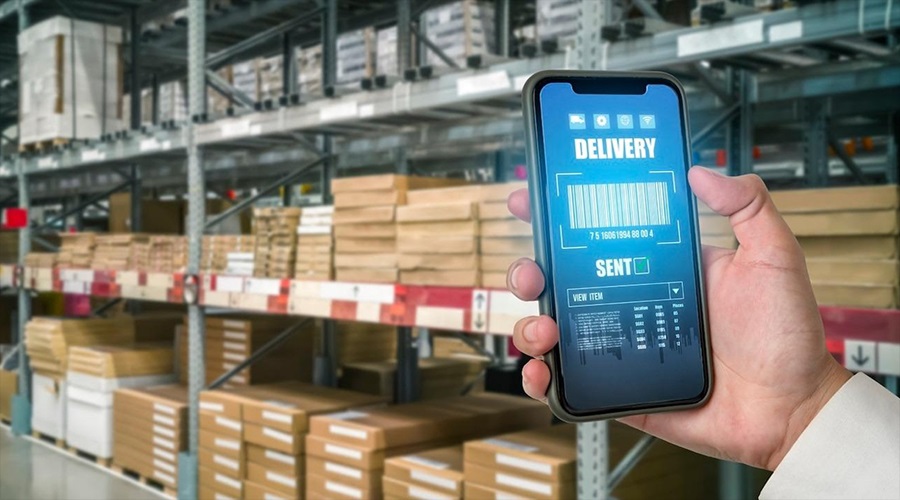
Mobile applications have turned warehouses into moving storage facilities. Apps are used to keep track of inventory management in real time, using barcode scanners, RFID tags and real-time databases.
The warehouse staff are able to update the stock quantities, log the incoming deliveries and detect shortages in real time. This minimises paperwork, overstocking and accelerates the order fulfilment. Warehouse managers are even able to forecast the demand tendencies with integrated analytics. In simple words, mobile apps are turning warehouses into data-driven, high-performing environments.
6. Predictive Analytics: The Future Is in the Data
Each shipment produces information: routes, times, expenditures, and customer values. Mobile apps capture it all. Predictive analytics allows logistics firms to anticipate demand, predict possible delays, and optimise the allocation of resources.
For example, an application may forecast maximum delivery times, and businesses will be able to schedule additional drivers or vehicles. They are also able to predict interference from weather or high-risk routes. Such foresight was not possible in the past. Today, using mobile applications, companies not only respond to a problem but also act before it happens.
7. Reduced Paperwork: Moving from Manual to Digital
Logistics used to deal with tons of paperwork: bills, invoices, receipts, and logs. All this has been digitalised through mobile applications. Starting with e-signatures to automated invoice generation, all documents can now be stored and accessed electronically.
This change saves time as well as administrative expenses. Drivers don’t have to carry hard copies, and managers can access data in real time on cloud storage. This results in quicker work processes, reduced errors and a more sustainable and green operation.
8. Safety and Compliance: Technology That Protects
Mobile apps have become extremely important in safety and compliance assurance. They can warn drivers of breaks, speed limits, and route restrictions. Others even keep track of the actions of the drivers, such as sudden braking, speeding, or excessive hours, to avoid accidents.
It also becomes easier to comply with regulations. Driving time, vehicle checks, and maintenance history are also automatically recorded by apps, which makes the company meet the government requirements. Logistics safety is not negotiable, and mobile technology could help to preserve it.
9. Customer Experience: The New Competitive Edge
The success of logistics today is not only related to the transportation of goods; it is also related to the satisfaction of customers. Mobile applications provide customers with real-time tracking, real-time updates, and convenient support access.
The power to know the place and time of a delivery contributes to trust. Apps also make payment processing, feedback collection, and order history tracking easier. The customer-focused apps enhance the retention and brand loyalty of companies. In a nutshell, satisfied clients promote repeat business, and that is what mobile apps do.
10. Sustainability: Greener Deliveries, Smarter Movement
The logistics industry is being pressed to go green, and mobile applications are making it a reality. Firms are reducing carbon emissions, optimising routes, minimising idle time and are becoming smart with fuel usage.
Electric vehicle (EV) adoption is also promoted via apps that monitor charging posts and battery status. Some even propose green driving. Mobile apps are leading to sustainability just as much as deliveries by cutting down on paper waste, minimising routes and supporting energy efficiency.
Mobile apps are leading to sustainability just as much as deliveries by cutting down on paper waste, minimising routes and supporting energy efficiency a perfect example of how Green Technology is shaping smarter logistics.
11. Cost Efficiency: Doing More with Less
Savings means efficiency, and both can be achieved with mobile apps. Real-time insights save on fuel expenditure, automated scheduling saves on downtime and enhanced communication saves operational expenditure.
Mobile applications are a revolution for startups and small logistics companies. They are more affordable than the traditional systems in terms of the investment required. Small players can compete with other industry giants with the availability of analytics and automation.
12. Integration with Emerging Technologies: Building the Future
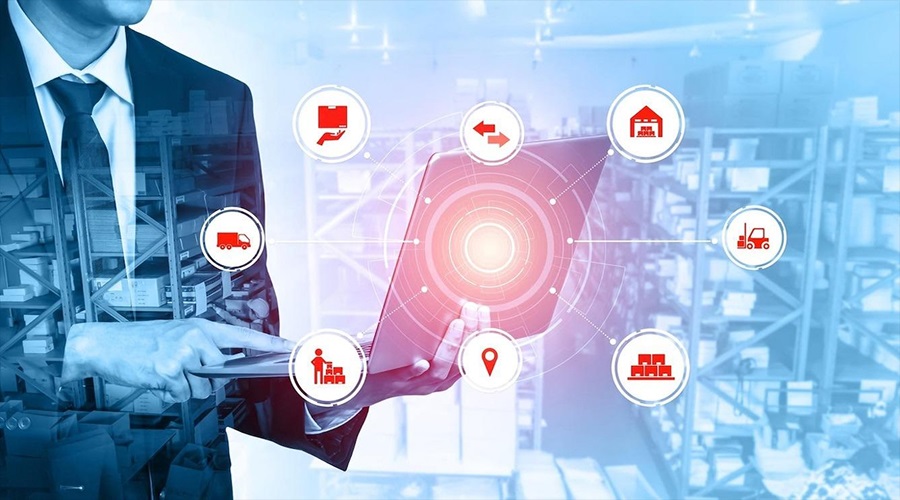
Mobile applications do not operate in isolation anymore. They have now become part of technologies such as AI, IoT, blockchain, and 5G and have made logistics smarter and more secure.
- AI is used to analyse information to streamline delivery times and the utilisation of resources.
- IoT links cars, sensors and devices to track them in real time.
- Blockchain will provide transparent and non-tamperable transactions.
- 5G drives quicker communication and almost immediate updates.
These technologies are integrated to create an interrelated ecosystem in which the flow of information is free and business processes are simplified. Transportation will not only become digital, but also smart.
Conclusion
Mobile apps have not only digitalised logistics, but they have also redefined it. They introduce visibility, control, and intelligence to all miles covered and packages delivered. To transportation and logistics businesses, it is no longer a choice whether to embrace mobile technology or not; it is a question of survival.
Mobile apps are the heart of the new digital supply chain, from optimising routes to sustainability. They speed up, streamline, and make businesses responsive. And with the ever-changing nature of technology, the future of logistics will certainly proceed at the pace of mobile innovation.

